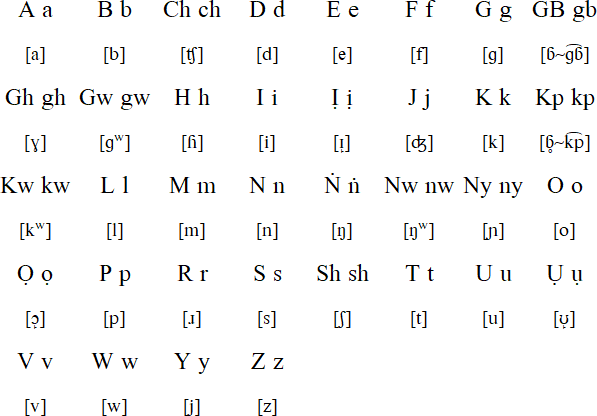 Igbo (Ásụ̀sụ̀ Ìgbò)
Igbo (Ásụ̀sụ̀ Ìgbò)
Igbo is a member of the Volta-Niger branch of the Niger-Congo family of languages, and is spoken mainly in Nigeria. In 2018 there were about 29 million speakers of Igbo in Nigeria, mainly in the southeast of the country, particularly in the states of Abia, Anambra, Ebonyi, Enugu and Imo. There are also Igbo speakers in Australia (2,000), Canada (4,240), and the UK (7,950).
There are numerous Igbo dialects, some of which are not mutually intelligible. The standard written form of Igbo is based on the Owerri and Umuahia dialects. Igbo is also known as Ibo, Ebo or Unege.
Igbo is recognised as a minority language in Nigeria and Equatorial Guinea. It is used in literature, and on the radio and TV.
Written Igbo
G. C. A. Oldendorp, a German missionary, was the first person to produce a book containing material written in Igbo, which consisted of a few words and phrases. His book, Geschichte der Mission der Evangelischen Bruder auf den Carabischen (History of the Evangelistic Mission of the Brothers in the Caribbean), was published in 1777. The first book in Igbo, Isoama-Ibo a primer, was produced in 1857 by Samuel Ajayi Crowther, an ex-slave and teacher who was also an outstanding African linguist, leader, and Africa's first Anglican bishop.
Igbo has been written with a number of spelling systems using the Latin alphabet since the 18th century. At first each person who wrote it used their own system. The Lepsius Standard Alphabet, devised by the German philologist Karl Richard Lepsius, was used from the 1850s. This was replaced in 1929 by the Practical Orthography of African Languages or African Orthography, which was created by the International Institute of African Languages and Cultures.
A syllabary for the Umuleri dialect of Igbo, known as the Nwagụ Aneke Script, was developed in late 1950s by Ogbuevi Nwagụ Aneke, an illiterate land owner and diviner. He claimed that spirits of his ancestors revealed the symbols to him. He used it to write many diary entries and books.
In the early 1960s a Nigerian government committee devised a new orthography for Igbo known as Ọnwụ, named after the chair of the committee, S. E. Ọnwụ. This became the standard way of writing the language in official, academic and literary publications, and in newspapers.
A modified spelling system, the New Standard Orthography, was created in the 1970s by the Igbo Standardization Committee. It was designed to make it easier to type the language on typewriters and computers, and to represent the sounds of the language better. However, this was not widely adopted.
Igbo alphabet and pronunciation (Igbo Ọ́nwụ́)

Notes
Tones are sometimes marked in writing: the low tone with a grave accent (à), and the high tone with an acute accent (á).


No comments:
Post a Comment